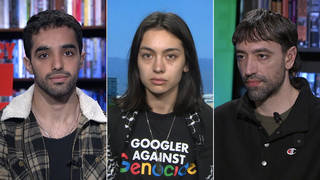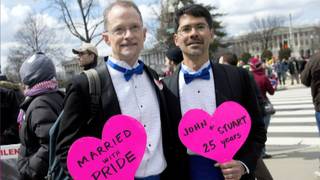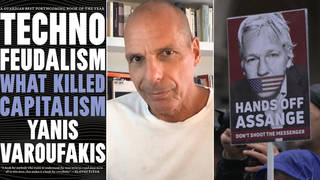
Related
Guests
- Martina Navratilovais a tennis legend. She is the winner of 59 grand slam crowns and a record nine Wimbledon singles championships. In 1981, Martina came out publicly, making her one of the first openly gay sports figures.
NBA basketball player Jason Collins swept sports headlines this week when he publicly revealed that he is gay, becoming the first professional male athlete to do so while still active in a major U.S. team sport. Collins noted that he was inspired by tennis legend Martina Navratilova, who became one of the first openly gay sports figures when she came out in 1981. Navratilova, the winner of 59 grand slam crowns and a record nine Wimbledon singles championships, joins us to discuss Collins’ announcement and her reaction to another advancement for LGBT rights: the legalization of same-sex civil unions in Colorado. Back in 1992, Navratilova helped file a lawsuit challenging the constitutionality of a Colorado amendment that prohibited state and local regulations that extend minority civil rights protections to homosexuals and bisexuals in Colorado. “Jason has been a breath of fresh air and a pioneer,” Navratilova says. “It takes a lot of guts to come out to your friends and family. For most gay people, coming out is the most traumatic experience in their life … He’s done a lot for the gay community, and I thank him for that.”
Transcript
NERMEEN SHAIKH: We end today’s show looking at the biggest story in the sports world this week. A professional basketball player named Jason Collins publicly revealed he was gay, becoming the first male athlete to do so while still active in a major U.S. team sport. Jason Collins made the announcement in Sports Illustrated and then sat down for an interview with ABC’s George Stephanopoulos.
GEORGE STEPHANOPOULOS: You always knew you were gay?
JASON COLLINS: Yeah, it’s—I sort of describe it as you know that the sky is blue, but you keep telling yourself that it’s red.
GEORGE STEPHANOPOULOS: So you fought it?
JASON COLLINS: Yes, in the beginning. I think they call it like the 12 steps. You know, you go through anger, denial and all—you know, it’s just—but when you finally get to that point of acceptance, there’s nothing more beautiful than just allowing yourself to, you know, really be happy and be comfortable in your own skin.
GEORGE STEPHANOPOULOS: So you send this thunderbolt out into the world.
JASON COLLINS: Yeah.
GEORGE STEPHANOPOULOS: Twelve hours later, how does it feel?
JASON COLLINS: It’s incredible. You just try to live an honest, genuine life, and next thing you know, you have the president calling you. And—
GEORGE STEPHANOPOULOS: What did he say?
JASON COLLINS: He was incredibly supportive, and he was proud of me and said that this not only affected my life, but others, going forward.
GEORGE STEPHANOPOULOS: Martina Navratilova said this is going to save some kids’ lives.
JASON COLLINS: You know, I look at her as one of my heroes. The dignity and the class that she’s lived her life and all that she’s achieved in her career, she is my role model. Hopefully, going forward, I can be someone else’s role model.
AMY GOODMAN: That was NBA player Jason Collins speaking on ABC about his decision to come out and how he was inspired by tennis legend Martina Navratilova. She came out publicly in 1981, making her one of the first openly gay sports figures.
Well, Martina Navratilova joins us now by telephone. She’s the winner of 59 grand slam crowns, a record nine Wimbledon singles championships. Today she adds one more victory to her name. As of midnight, same-sex couples in Colorado officially obtained a civil union and have it be recognized by the state today. Back in 1992, Martina was among those who filed a lawsuit challenging the constitutionality of a Colorado amendment that prohibited state and local regulations that extend minority civil rights protections to homosexuals and bisexuals in Colorado. Martina tweeted [Tuesday], “Colorado Civil Unions To Begin At Midnight Tonight- Colorado has come a long way since 1992 amendment 2-keep going:)”
Martina Navratilova, welcome to Democracy Now!
MARTINA NAVRATILOVA: Thank you very much. I better be careful what I tweet! I keep thinking I’m only tweeting to my followers. But it’s out there, isn’t it?
AMY GOODMAN: Well, now your friends and family have gone viral around the world.
MARTINA NAVRATILOVA: Yeah.
AMY GOODMAN: Your response first to the man who worships you, to Jason Collins, who has come out? In Sports Illustrated, his first sentence—his first sentence is: “I’m a 34-year-old NBA center. I’m black. And I’m gay.”
MARTINA NAVRATILOVA: Well, it’s pretty funny when a guy that’s a foot-and-a-half taller calls you a role model. But Jason’s been a—has been a breath of fresh air and a pioneer. I mean, it takes a lot of guts to come out to your friends and family. For most gay people, coming out is the most traumatic experience in their life, because of the worry about the backlash: “What’s going to happen? Are my parents going to accept me? Are my friends going to accept me? Are my sisters and brothers going to accept me?” And to come out to the whole world is—you know, is an extremely brave thing. And Jason has done it in a climate that’s certainly much more friendly to gays and lesbians, but still in the sports world it’s a big no-no. So, kudos to him.
NERMEEN SHAIKH: Martina Navratilova, could you talk about your own experience coming out and how different it is, the response was then to the response to Jason Collins?
MARTINA NAVRATILOVA: Well, my response was much more—much more mixed. And, you know, some positive on one end: When I lost the U.S. Open finals to Tracy Austin about a month after coming out, the crowd was very supportive. But for the most part, it was negative. The media certainly roasted me. I had my share of, you know, “Here’s Martina’s love nest,” or “Good Versus Evil,” as one columnist headed a column about me playing against Chris Evert. So, it was pretty nasty, but, you know, you just kind of deal with it.
The funny thing that I just realized today is that Jason came out, and it’s—not only is the response positive, but the press wants to talk about it. It’s a big story. With me, it was a big story, but it was like on an embarrassing level, you know, the way the press portrayed it. I certainly didn’t get an invitation to speak on Good Morning America, because it was like still a taboo subject. It was such a negative subject, it made headlines, but in a very bad way.
AMY GOODMAN: Let’s see. President Obama congratulated Jason Collins. President Reagan was president at the time when you came out.
MARTINA NAVRATILOVA: Yeah.
AMY GOODMAN: What was his response?
MARTINA NAVRATILOVA: Well, certainly there wasn’t one, and I didn’t expect one. It’s great that Obama is supporting Jason, but in the '80s the climate was such that there were thousands and thousands of gay men dying from AIDS, yet President Reagan didn't mention that, so a phone call to me would have been unthinkable. I just wish that he had been more supportive of our community in the wake of the tragedy that was AIDS. It took years before he ever mentioned the name.
AMY GOODMAN: Talk about the decision you made to go public back in the early ’80s. What went into you—for a lot of people who are listening right now and watching this broadcast, maybe a lot of professional athletes, as well, talk about your feelings in those months leading up to this and how exactly you came out.
MARTINA NAVRATILOVA: Well, it wasn’t exactly a decision to do it. I just—I always thought I would say so one day. I never felt I had anything to hide. I never felt being gay was anything to be ashamed of, so I never felt apologetic. I didn’t have issues with it, didn’t grow up with any religion, so I didn’t have any religious, you know, issues to deal with as far as homosexuality is concerned. So, I accepted it very easily. For me, it wasn’t that big a deal. But still, to make it public to the whole world is a different story. I really couldn’t come out until after I got my citizenship, because it was a disclaim—back then, it could have been a disqualifier. I could have been denied my U.S. citizenship because I was gay. So I didn’t—I stayed quiet.
AMY GOODMAN: Explain what you mean.
MARTINA NAVRATILOVA: Pardon me?
AMY GOODMAN: Explain what you mean.
MARTINA NAVRATILOVA: Well, I—OK, I defected in 1975 from Czechoslovakia, then Czechoslovakia. And I got my political asylum and applied for U.S. citizenship, which was due in 1981. And if I came out as gay, the Naturalization Service could have said, “No, we’re not going to give you your citizenship because you are gay.” That was a disqualify—it could have been a disqualifier to get my citizenship, so I kept quiet. I didn’t lie. When reporters asked me, I just didn’t answer the question. I said, “That’s private, and I’m not going to talk about it.” And then, once I got my citizenship, you know, I didn’t have to hide anymore.
NERMEEN SHAIKH: Martina Navratilova, can you explain what the impact was on your career, on your tennis career, both in terms of actually playing the sport and in terms of endorsements, once you made this revelation?
MARTINA NAVRATILOVA: Well, the endorsements didn’t come, because I was obviously—I was number one for a long time and didn’t get the outside endorsements other than what came with tennis, which meant tennis rackets and—shoes, rackets and clothing. Outside of that, I didn’t get any outside deals. But I think because I came out and I was true to myself and was finally able to just be free and not have to pretend, not have to lie, not have to hide anything, I think because of that, I played better tennis, and, you know, of course, was a much happier person. So, I think it helped me become a better tennis player. Most of all, I felt free. And you can’t put a price tag on that. Financially, did it cost me? Absolutely. How much? I don’t know, and I really don’t care.
AMY GOODMAN: Do you think it’s easier for women to come out than men?
MARTINA NAVRATILOVA: Not necessarily, but I think—it’s funny. In sports, women have to kind of prove their heterosexuality when they’re really good athletes. There are women that have written books proclaiming their heterosexuality, just in case anybody thought that they were gay, because for a lot of girls growing up, as soon as they’re athletic, they’re called—they’re called unnatural or lesbians or whatever. And a lot of straight girls don’t even get involved in sports because they don’t want to have that kind of bullying happen to them. So it’s almost assumed that you are gay; you have to prove that you’re straight. But for guys, in the macho sports, it’s the other way around. So it’s easier for them to hide, because nobody will ask them, “Are you gay?” I don’t think any—I’ve never heard of a male reporter asking a male athlete, “Are you gay?” but they certainly feel free to ask the women. So, it’s just—you know, again, there’s a kind of a double standard with men and women. But I think women, perhaps, I don’t know why, they have been braver over the years in coming out. I don’t know.
AMY GOODMAN: Well, from Collins to Colorado, as of last night, midnight, Colorado can officially obtain, same-sex couples there, a civil union, have it recognized by the state. Talk about what you did in 1992 filing a lawsuit.
MARTINA NAVRATILOVA: Well, first of all, kudos to Governor Hickenlooper for signing this. And I’m sure that he will go a step further eventually. I think we will have full marriage rights in Colorado. But in 1992, there was a very hateful Amendment 2, that basically made it legal for any institution to deny gays and lesbians access, whether it’s hospitals or restaurants or employment. Anybody could fire you or not let you in a restaurant because you were gay. And I had wanted to speak to the press about this amendment prior to the election, because I was scared that it would pass, and nobody wanted to talk to me and said, “Oh, no, no, it will never pass. It’ll never pass.” Sure enough, the election comes, Bill Clinton wins, Amendment 2 loses. It passes by a vote—it was like 52 to 48 percentage, even though before the vote, it showed that it wouldn’t pass. But it did pass. And the next day, my PR agent had like 200 phone calls and requests for interviews. Everybody wanted to talk to me now. It was too late. So—but it was overturned at the Supreme Court, as it was unconstitutional. But there was a big fight over nothing, unfortunately.
AMY GOODMAN: Last comments, Martina Navratilova, on this day where, well, the first male openly gay athlete in pro sports, Jason Collins, has come out and cited you as his hero?
MARTINA NAVRATILOVA: Kudos to Jason. I hope he’ll sleep better now, now that he can truly be himself, and maybe his basketball career will take off. I hope he finds the team of his dreams, because he’s a free agent now. But I know that he’ll live a much happier life, and he’s done a lot for the gay community, and I thank him for that.
AMY GOODMAN: Martina, thanks so much for being with us. Martina Navratilova, tennis legend, winner of 59 grand slam crowns, record 9 Wimbledon singles championships, came out in 1981, making her one of the first openly gay athletes.
And that does it for our broadcast. Democracy Now!'s Juan González's new film Harvest of Empire premieres in Houston Friday, May 3rd, at the Sundance Cinema, plays there through May 10th.












Media Options